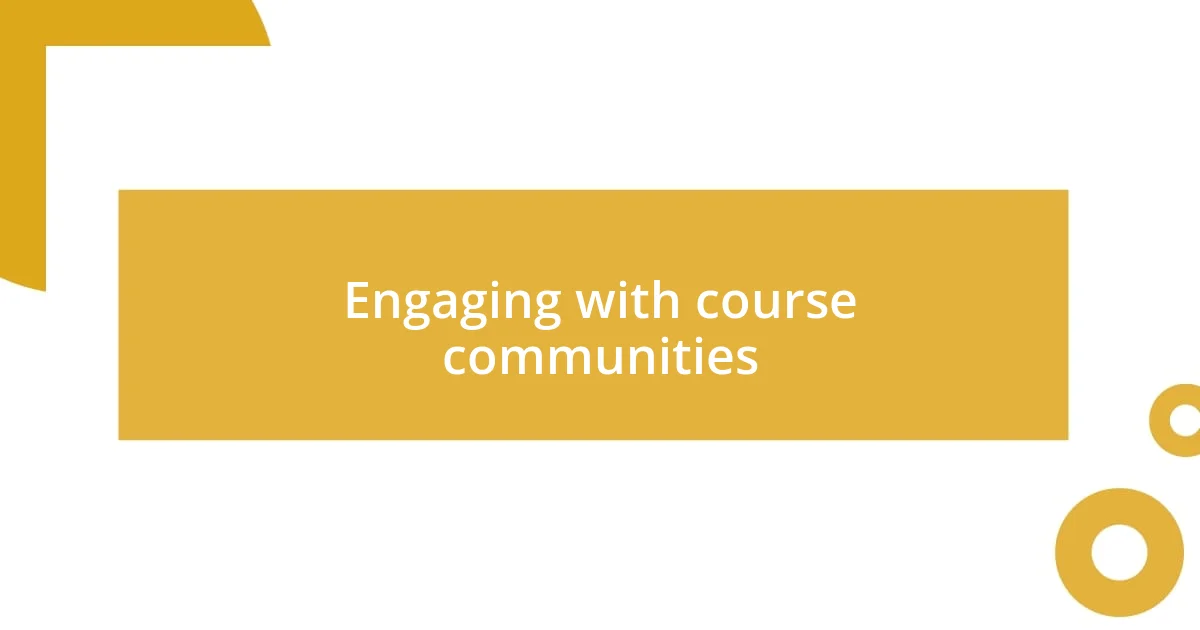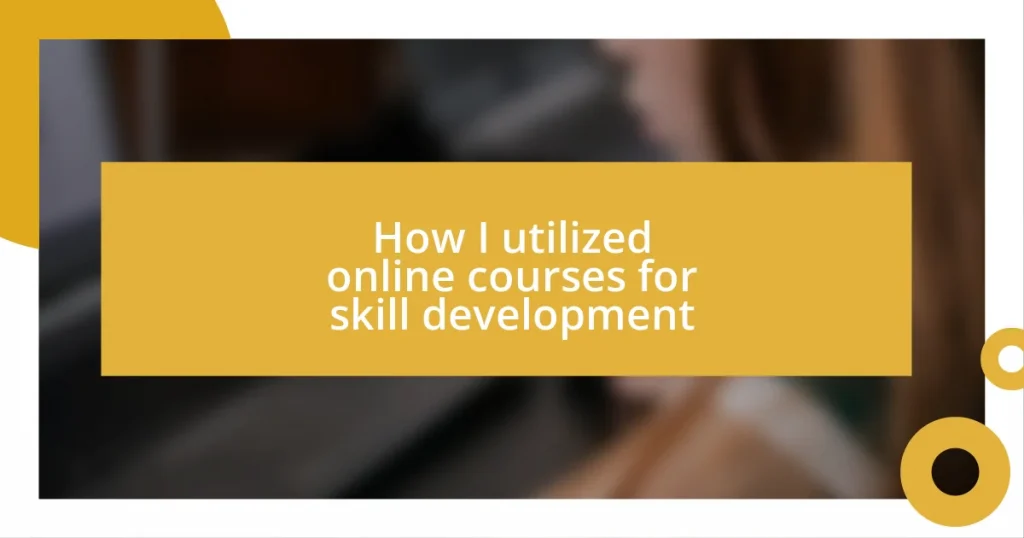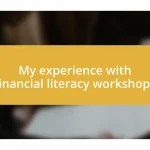Key takeaways:
- Identify skill gaps and seek feedback, as acknowledging weaknesses is crucial for growth and development.
- Select online courses based on relevance, platform reputation, and instructor credentials to align learning with personal goals.
- Engage with course communities and apply skills through practical projects to reinforce learning and build confidence.

Identifying your skill gaps
Identifying skill gaps can be a bit daunting, but I’ve found it helps to really take a step back and reflect on where I struggle. For instance, during a recent project, I realized that my proficiency in data analysis was lagging behind. It was a moment of clarity—one of those “ah-ha” moments where I understood that I could be performing much better.
Have you ever faced a situation where you wished you had a specific skill? I remember a time when a new software tool was introduced at work, and I felt overwhelmed. Instead of shying away, I made a list of what I didn’t know and what I needed. That checklist became my roadmap for skill development. It turns out that pinpointing exactly what you lack is the first step towards bridging that gap.
It’s also valuable to seek feedback from peers or mentors. I once asked a colleague for a review on my presentation skills, and their insights were eye-opening. The constructive criticism helped me realize that while my content was solid, my delivery needed improvement. Those moments of vulnerability can be uncomfortable, but they are crucial for growth. What gaps in your skills are you willing to confront?

Selecting the right online courses
Choosing the right online courses can feel overwhelming, especially with so many options available. I remember sitting down one evening, staring at a long list of potential courses, and feeling lost in the sea of choices. To clarify my path, I focused on aligning courses with my specific goals, considering factors like course content, duration, and the teaching style. A course that adapts to how I learn is always a bonus!
When selecting an online course, consider these key factors:
– Reputation of the platform: Research the credibility of the platform offering the course and read reviews.
– Content relevance: Ensure the course material aligns closely with the skills you want to develop.
– Instructor credentials: Look into the instructor’s background to assess their expertise in the subject matter.
– Community and support: A strong community can enhance the learning experience through networking and collaboration.
– Flexibility: Choose courses that allow you to learn at your own pace to fit your schedule.
Each of these elements played a significant role when I chose my data analysis course. I prioritized platforms known for quality and sought out instructors whose knowledge resonated with my learning style.

Creating a structured learning plan
Creating a structured learning plan is essential for effective skill development. When I set out to improve my data analysis skills, I sketched a roadmap. This helped me visualize what I needed to learn and the order in which I would tackle each topic. I remember breaking my plan down by weeks, dedicating specific days to modules that focused on statistics, data visualization, and practical applications. Seeing everything laid out made the daunting task feel much more manageable.
One critical aspect to consider is incorporating milestones into your plan. For example, I set aside time to apply what I learned through small projects after completing each module. This approach not only reinforced my knowledge but also gave me tangible results to showcase. To stay motivated, I peppered in rewards for myself, like a favorite treat or a day off after a particularly challenging project. Celebrating these small victories fueled my motivation to continue moving forward.
The structure of your learning plan can look different for everyone. Some prefer a linear timeline, while others thrive in more flexible, adaptive environments. Personally, I found that a blend works best for me. I created a table where I could track my progress alongside deadlines. This allowed me to stay accountable and adapt my plan if I encountered unexpected challenges, like a module taking longer than anticipated. Having that visual representation really kept me grounded.
| Feature | Description |
|---|---|
| Clarity of Goals | Clearly define what skills you want to acquire or improve. |
| Timeline | Set specific deadlines for each phase of your learning. |
| Feedback Mechanism | Incorporate regular check-ins, either with yourself or a mentor. |
| Adaptability | Remain open to adjusting your plan based on your learning pace. |

Engaging with course communities
Engaging with course communities has been a game-changer for my learning journey. Early on, I hesitated to interact with others in course forums, but I soon realized how beneficial it is to connect with fellow learners. I remember joining a discussion about a particularly tricky data visualization concept. The insights and examples shared by peers transformed my understanding—sometimes, seeing the same problem through someone else’s eyes can illuminate solutions you might not have considered.
Participating in community activities can enhance not just knowledge, but confidence too. After sharing a project I worked on, I received feedback that I didn’t expect. It was both motivating and constructive. The positive reinforcement from others propelled me to tackle even more complex challenges. Isn’t it remarkable how a simple exchange with another learner can ignite your enthusiasm for a subject? It certainly made me look forward to contributing more and helping others whenever I could.
One memorable moment was when I participated in a virtual study group. We scheduled video calls to discuss course materials, which felt more personal than just online forums. We shared resources, tips, and even our struggles. This camaraderie kept us all accountable. In fact, I still have a couple of study buddies from that group with whom I occasionally collaborate on projects. The relationships I built through those interactions have turned out to be invaluable—not only for networking but for building lifelong friendships in my field.

Applying skills through projects
When it comes to applying skills through projects, I’ve often turned to hands-on experiences as a crucial part of my learning process. For instance, after completing a course on digital marketing, I decided to create a mock campaign for a local nonprofit. This project not only allowed me to put theory into practice but also filled me with a sense of fulfillment as I saw my ideas take shape. Have you ever had that moment where your hard work pays off? It’s exhilarating.
One of my favorite projects was developing a personal website to showcase my design skills. I remember feeling a mix of excitement and anxiety as I started—from choosing the layout to writing content that truly represented me. Each small victory, like successfully embedding a video or creating an eye-catching graphic, reaffirmed my abilities. Ultimately, seeing my finished site felt like holding a piece of my progress in my hands and made the countless hours of learning worthwhile. That sense of achievement? It’s hard to beat.
I’ve learned that intentional project-based learning fosters deeper understanding. For example, while taking a course on programming, I challenged myself by building a simple app. I encountered several roadblocks, and it wasn’t smooth sailing by any means. However, pushing through those challenges—debugging lines of code and tweaking functionalities—was incredibly rewarding. Looking back, I realize that genuinely grappling with problems is where the most significant growth happens. How about you—what challenges have helped you sharpen your skills?

Measuring your progress effectively
Measuring progress effectively has been instrumental in my skill development journey. At first, I relied on completion rates, thinking that just finishing a course meant I was learning. However, as I delved deeper, I discovered that tracking specific skills gained was far more revealing. I remember making a simple chart where I noted down new concepts mastered after each module—it helped me visualize my growth like never before. Have you considered how powerful visual aids can be in recognizing your progress?
One method I found particularly helpful was setting specific, measurable goals before starting a new course. For instance, after I enrolled in a graphic design program, I aimed to grow my proficiency in Adobe Photoshop to create two unique projects by the end of the course. Knowing my objectives kept me focused and motivated. It was rewarding to check off those milestones, bringing a sense of accomplishment that fueled my drive. Reflecting on these goal-setting experiences, I can’t help but wonder—are you clearly defining what success looks like for you?
Another beneficial strategy I employed was gathering feedback from mentors and peers regularly. When I was creating an online course on video editing, I often shared rough cuts with friends and asked for their thoughts. Their insights not only highlighted my strengths but also pointed out areas for improvement. That external perspective became a guiding light, helping me refine my skills. Do you have someone in your circle who can provide honest feedback? I found that those moments of constructive critique are where real advancements happen.

Continuous learning and improvement
I firmly believe that continuous learning is essential for personal and professional growth. Every course I’ve taken has opened a door to new insights and skills. I remember feeling a surge of anticipation each time I started a new module, eager to see how it would add to my skill set. Have you felt that excitement when plunging into a fresh topic? It’s a reminder that our pursuit of knowledge is a journey, not a destination.
Embracing a mindset of continuous improvement can also come with its fair share of challenges. I once signed up for a data analysis course, thinking I could breeze through it. However, I quickly found myself struggling with concepts that were more complex than I’d expected. But instead of shying away from this difficulty, I leaned into it. I sought extra resources, like forums and study groups, which fostered not only my understanding but also my appreciation for collaboration. How do you tackle difficulties when they arise in your learning?
One aspect I cherish about continuous learning is the ability to revisit past lessons and refine them. A few months after completing a web development course, I reexamined a project I had created. To my surprise, I spotted numerous enhancements that could elevate its quality. Finding the confidence to revamp my old work was exhilarating—it felt like unearthing a treasure. It’s a constant reminder that improvement is an ongoing process. When was the last time you looked back at your previous work and found ways to enhance it? The satisfaction of refining your skills can be incredibly liberating.














